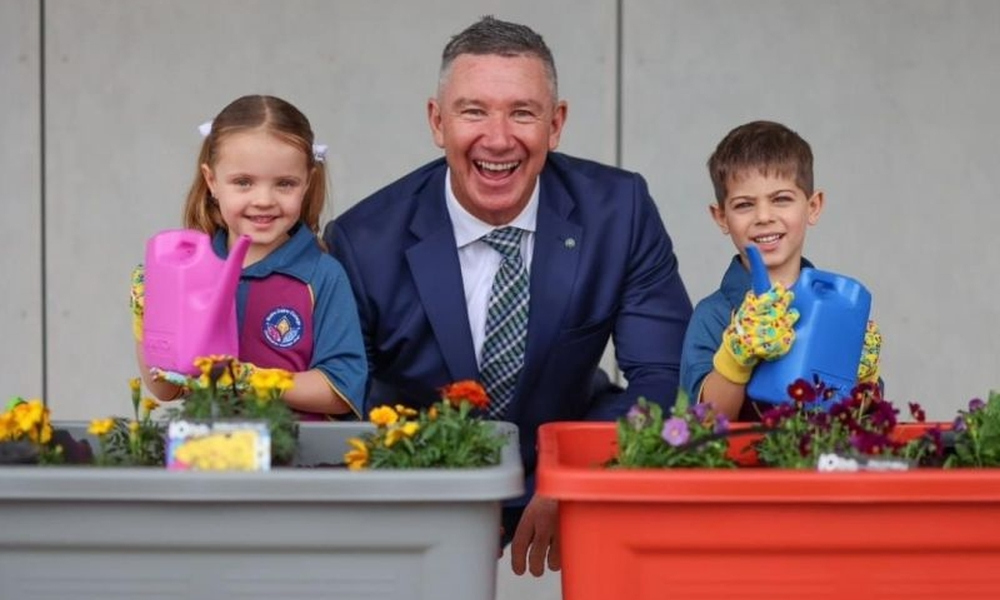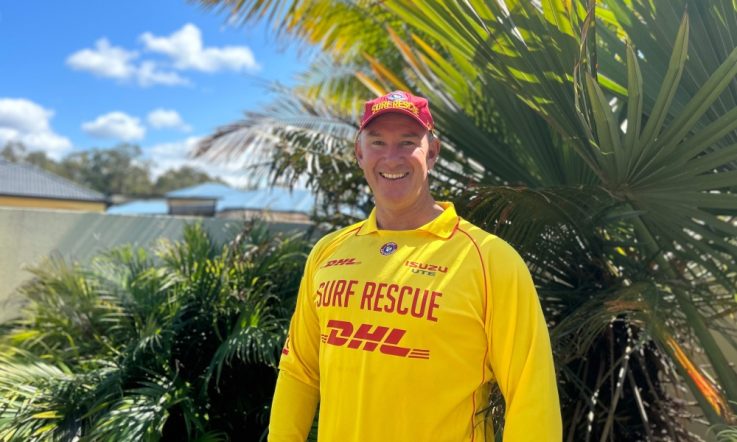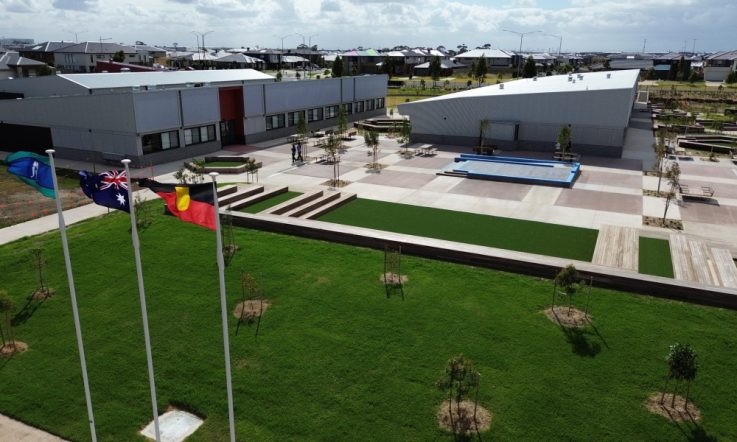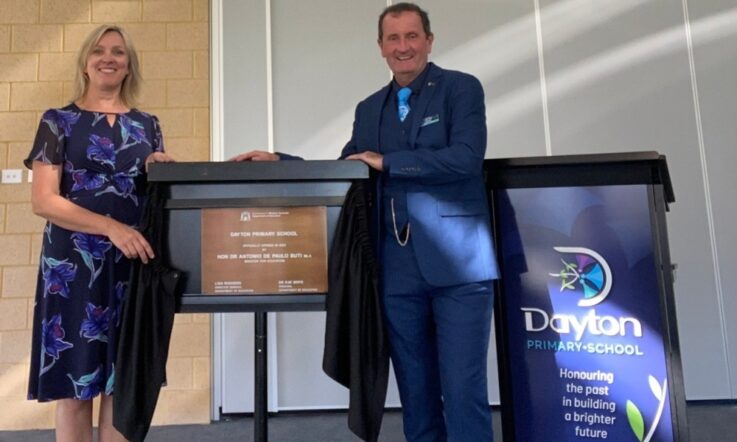Before we get into this episode, are you subscribed yet to the free weekly Teacher bulletin? Get a weekly wrap of our latest content straight to your inbox. Join our community by clicking on the sign-up button at our website, teachermagazine.com.
Hello and thanks for downloading this podcast from Teacher – I’m Jo Earp. Welcome to Episode 2 of Series 3 of School Assembly.
So, School Assembly is the podcast series that explores what it takes to build a school from the ground up. Last time out, we met our Series 3 principal for the first time – Dan McShea, who’s leading the new P-12 Notre Dame College on Queensland’s Sunshine Coast. So, over the next year we’re checking in with Dan each month to talk about a different topic and just have a bit of a chat about what’s happening, really. Episode 2 is all about student enrolments – from making initial connections with the local community and juggling the many enrolment interviews, to some eye-catching ways that Dan’s tackling the challenge of selling a vision for a school that doesn’t exist yet. Enjoy the episode!
Jo Earp: Hi Dan. Great to catch up with you again. So, we launched Series 3 last month with you as our foundation principal. I'm really interested, what's the response been to the first episode from colleagues in the community?
Dan McShea: Yeah. Well, it's been fantastic, actually Jo. I'm grateful for the opportunity. The response has been overwhelmingly positive from colleagues and community members and many of them have shared their excitement and support for our vision and for our new college. And many have expressed that they're inspired by our mission to create an innovative learning community, and it's really heartwarming to see that sort of enthusiasm and commitment from everyone involved. I've got to say that the generosity and willingness to share from others that have been on a similar journey in the past has been wonderful, and I've enjoyed that.
JE: Did you listen back to that episode? Because it's always a bit freaky when you listen to your voice for the first time, isn't it, on something like that.
DM: Yeah, to be honest, I can't stand sound of my own voice, so I didn't listen to it back, but I've spoken to others that did.
JE: Well, you were very good!
DM: Oh, thank you.
JE: So, let's crack on with the second episode then – I think it's a great start. So, the school's due to open then to students in January, but there's a lot that's already happened – because, I was having a look – the building seems to be coming along nicely; I saw that you've got updates on the socials about the completion of the prep classrooms, the roof completion on all the other buildings. You've even got your school uniform sorted – and we'll talk about that in an upcoming episode. So, a lot has happened already. But the topic today is about enrolment; so, getting enough students to fill it. When does that start? How far in advance and do you have any sort of strict system requirements or, you know, sort of legalities around that?
DM: Look, yeah enrolments really is a critical aspect and probably within the seasons of this year without staff and students the focus shifts quite a bit. But that focus on enrolments, particularly early and ongoing throughout the year, has been a big one, and certainly something that took up a lot of my time, particularly in terms 1 and 2 where, you know, my weeks would be filled with back-to-back enrolment interviews.
We started accepting enrolment applications for this school from term 4 of last year, so there was quite a number of applications ready and waiting in January when Donna and myself started here. And we were able to begin processing and interviewing those straight away, from the get-go, as early as the end of January. And look, I've got to say as much as it takes up quite a bit of time, it's a great privilege to have the opportunity to meet every single family and every single student that's going to be coming to your school. And that's, you know, often a privilege that you don't get in a larger school where there may be lots of different people that are completing those enrolment interviews and having those meetings; and it’s something that I'd like to hang on to as a school gets a little bit bigger, even if it was just to meet the new families.
JE: That’s interesting that. It’s another thing I've not thought about that right at the beginning, when you're doing all the enrolment interviews, you've got them all in one batch. And so normally you wouldn't have that many, and like you say, it would be spread across. So, just trying to find the time. When will you kind of be accepting enrolments? [How] are you doing with them? Is there, like a cut-off point where you're like ‘no, we can't take any more’? Or you're just trying to get as many as possible? How does it work?
DM: Look, we've certainly had some targets, and our funding for our school was based on projected enrolment figures and so we were working towards them from the start. But you know, in the initial stages in those initial interviews, we were able to offer positions on the spot in the interview at the start. We really just had to get some momentum and get those numbers moving. In our context, we're opening with prep, year 1, 2 and 3, and year 7 – and the year 7 group’s about 90 students; 2 prep classes; one each of 1, 2 and 3. And so, we're currently accepting enrolments up until 2029. And we'll be interviewing for 2026 enrolments for year 7s next term, in term 4 of this year.
JE: Wow, that’s a long way in front! In Series 1, then, one of the strategies we spoke to Ray and Rachel over in WA and they had a brand-new school, obviously, and new suburbs, there was a lot of building going on there. One of the strategies that they employed was delivering flyers around the community. So, when we spoke to them, they were actually walking around doorknocking handing out the flyers. What kind of things have you done? Is that something that the system can help you with?
DM: Look, there certainly was great support from our system in terms of the marketing team and they did arrange for, you know, really strong social media presence, some good images and virtual flythroughs of our school. We did have some flyers that were delivered in the local area, although probably our most significant area wasn't able to be serviced by some of those distributors. So, we actually had a parent of a year 7 student for next year that's an avid walker. And so, she actually offered to distribute those flyers for us in the area closest to our school; and I think she did it for a bunch of flowers and a bottle of wine in the end. But, yeah, really grateful to have that sort of support. And it was actually probably that drop that triggered a fair response in terms of a noticeable spike in enrolment enquiries.
JE: That's nice, getting the parents involved early on.
DM: Yeah. Look, we've just noticed this is a whole new community as we mentioned last time and there really is an appetite from that community to be connected with each other and to be taken on the journey of the construction of our school. So, we've tried to be pretty active on our social media in telling that story and now using different voices and faces to tell that story. We've had a number of parent engagement events. We've actually got one tonight as well with our dads. So, you know, on the occasion of Father's Day week. So, we've just gotten an event at a local venue tonight and we've got a bit of [an event] next week with some of our parents as well. So, we've just found that there's been an appetite to keep feeding that sort of connection with our prospective families, which has been really nice.
If you’re enjoying the Teacher podcast channel, have you subscribed yet to the free Teacher bulletin? It’s the best way to get our latest stories straight to your inbox. In addition to a weekly wrap up of our latest content, subscribers to the bulletin can receive Teacher Trending, where we share our top 5 pieces of content on a trending topic, and special editions where we share a bonus piece of content with you. The sign-up process is easy – just visit our website, teachermagazine.com and click on the sign-up button on the righthand side of the homepage.
JE: Oh, I like that thinking as well – have a Father's Day week themed event. That's nice thinking! Good on whoever's doing that marketing. Do you have [a geographical] area for enrolment? Do you have a set area?
DM: No, we don't have a set area in our system, or any rules or guidelines around that. What I would say is most of our early years enrolment – so, for that prep to 3, have come from within this local community or are moving to this local community for next year. In regards to our year 7 enrolments, they've come from everywhere. So, you know, the southern end of the Sunshine Coast drawing from about 15 or 20 different schools across the coast; and, again, a number of families that are moving to the community in the new year. We found out just this week that the train station for the new train line is actually, I knew it was within a kilometre of our site, but it's actually right at our back door. So, that will open up our college for students from, you know, Glasshouse Mountains, Landsborough, and beyond, which is exciting as well.
JE: Oh, wow. So, you're going to have great transport links as well, then. I was interested, do you have a minimum number for opening? Is there such a thing as a minimum number where they go ‘look, you just haven't got enough, sorry’.
DM: I think, we've got some great demographers in our system that looked to the original strategy of building a school in this space. And they were confident that there was a strong demand for a school. We’re the only (I believe) non-government school to go into this new community and our funding for our building application certainly is based on projected enrolments. Originally our school was set to open this year, in 2024, and for a number of reasons that was delayed until this year. But that's probably only increased the demand for the school. So, those projections of 2 prep classes, one each of 1, 2 and 3, and 90 year 7s (which we will actually split into 4 classes) we’re well and truly on track for those numbers. Although, the year 1 class itself has been a little bit slower than the rest and I think that's more because those children have just begun their schooling in a prep classroom and might be some reluctance to change school during their first year of school, except if they were moving. So that's been probably the only year level where we'll be a little bit shy of what was projected.
JE: The other thing, at the other end of the scale, what happens as a principal if you're oversubscribed … you know, if people are wanting to enrol for next year, year after, or whatever, what happens if you meet that limit? Do the people go on a waiting list, or do you just have to say ‘no, I'm sorry’.
DM: Yeah, look, we find on the coast that there is a little bit of transiency in our population. So, we do have waiting lists at the moment in 4 of our year levels, and so we monitor that and try to communicate well with parents about the likelihood of a place coming up, or we've certainly interviewed them, and we'd be ready to go if a place did come up. So, yeah that's the reality.
JE: So yeah, I mean, you've got to stay flexible anyway, haven't you? Because you're getting people moving in and out during the school year as well, aren't you?
DM: Absolutely. But with our construction program we build in stages for 2 years. So, in the event that we were oversubscribed in some of those years, we would possibly have the buildings to add an extra cohort or an extra group to a year level. And so that's something that we've looked at and we haven't decided to go that way on this occasion. But, down the track there's often times where there will be enough classrooms to be able to do that if there was significant demand. So, we'll look at that as we go on.
JE: One of the things with this series that always impresses me is … we know about the complexity of being a principal but, like, we're talking about a tiny little bit of your role and yet this is so complex – and yet it's just a very small bit of the role, isn't it? So, it's like, yeah, that always impresses me. With a brand-new school then, that's not open yet, you're trying to get people to enrol, they haven't got an example of even what the school looks like, they can’t come and see the classes. As a foundation principal then, you're just selling a vision at the moment then. Aren’t you, presumably?
DM: Absolutely. It's all about painting a vivid picture of what our school and our community, our culture will be like and will look like. And all of our staff – there's 4 people on our team at the moment and another 4 to join us next term – need to be able to tell that story and answer those questions as well. And I think it's about building trust and excitement around the future that we're creating together and helping families to feel confident that they're making a great choice for their child's education and for their future.
I guess some of the things that have really helped – we ordered a 3D scale model of our school which sits on a table in our office. And that's been wonderful, because families can come in and point and see where their classroom's going to be, and the playground, and the sporting facilities, and all the aspects of our school in an interactive way. That's been exciting. And the things that architects are able to do now with virtual tours, and renders, and flythroughs is, you know, really remarkable and has changed dramatically even in the last couple of years. We've had the ability to fly in and out of every single room in our completed school virtually as well, which has been exciting.
We had some caricature cutouts, life-size cutouts, of our school uniform made, which has been pretty cool as well. Because, you know, at some of our family engagement and parent engagement events, they've been popular for students to get a photo beside or just to see the uniform and the colours and just start to imagine what it might look like for them if they were wearing those colours.
JE: That's really cool! So, you’re employing some really interesting ways to get that vision across; I really like that. The other thing as well is last episode you mentioned, you were sort of squashed into, did you say a shopping centre you're currently based in? An office in shopping centre, is that right?
DM: We are. We are upstairs in an IGA complex. So, it's a great sort of studio room with 2 side rooms, but it’s going to get a little bit cosy next term when 4 more roles join us.
JE: So, is that where you've been doing all the interviews as well then?
DM: Yep, that's our enrolments office. That's where we're working and planning and we also have a lot of meetings in here as well. So, there's always people coming and going from this space and it's small enough that everyone can hear everyone's conversation. So, it's a new way of working that I've been calling ‘radical transparency’!
JE: I like it. OK then … actually, I was going to ask about forward enrolments, but we've actually touched on that. So 2029 you go up to, then; so you're like 5, 4 years in advance, aren't you?
DM: Yeah, look, we haven't been actively, you know, promoting applications for that year but we have received, and in our system allows us to accept, applications that far in front. So yeah, we've got a lot of applications for 2026, and we will begin interviewing those year 7 students for 2026 (our current year 5s) in term 4, and we will interview for prep families early in the new year for 2026.
JE: Yeah, because parents want some stability, don't they? They want to know a yes or no. And, you know, in terms of planning, you’re obviously planning a few years out as well, so that's good. OK, then. So, we'll come back to enrolments sort of through the series and we'll touch on how you’re going and things like that in future episodes. But last thing is to do the usual 3 questions for the month. Let's think about the month that's just gone then. Proudest achievement, hurdle – I'm saying hurdle these days rather than challenge – and key learning. So, let's start with proudest achievement.
DM: Look, we had a soft opening or a soft launch of our completed prep classrooms in this last month and that saw some early construction of some completed uniforms, which were worn by 2 of our prep students for 2025; their families, we had 2 of our teachers for 2025 there on site. It was a cracking day, and it was great to see that this is really happening and really coming together. And our Executive Director, Dr Sally Towns was present at that, and a number of number of dignitaries. So that was pretty special and covered well in the media up here. So that was great, and that was probably certainly our proudest achievement, a pretty special day.
JE: Nice! Hurdle, then. Hurdle? Challenge? Sticking point? We'll call it sticking point, Dan!
DM: It's probably just balancing the many moving parts, while ensuring that we're staying true to our vision, our values, our virtues, and the core of what we want to do. And you often find that one task, or commencing one task, leaves you going round in circles with all of the other decisions, policies, procedures that need to inform a document like, for example, a year 7 student organiser. To complete that, we've got to make decisions about building names, house names, uniform policies, leaving procedures, all of those things. So, it feels like the tail’s wagging the dog sometimes and vice versa, and you can go around in circles. But they're great conversations, and it's great to have the time to set those things up properly from the start.
JE: And key learning, then, anything that stuck out you thought ‘oh, yeah, that's something new for me’.
DM: Look, I think what's been really evident is the importance of community engagement and of telling your story. And I found that the more we involve our community in our journey, including the staff that we've offered positions to for 2025, the stronger and the more united that we become as a community, or as a new community. So that's been a learning.
JE: Excellent, very good. Well, it's been lovely to speak to you again today. I'm going to let you get back to it because you've got a lot on, as you say, you've got all those moving parts to juggle! You have a wonderful September, and we'll catch up with you again in a few weeks.
DM: Thanks, Jo. I look forward to it. Have a great day. See you soon.
Thanks for listening, that’s all for this episode, but if you want to hear more there are another 300+ episodes in the Teacher archives for you to binge on now. Just head over to teachermagazine.com, or wherever you get your podcasts from. And remember – leave a rating and review. Bye!
Before you go, are you currently subscribed to the weekly Teacher bulletin? It’s a free weekly wrap of our latest content straight to your inbox. Join the more than 40,000 educators who are already part of the community by clicking on the sign-up button at our website, teachermagazine.com.
Other episodes in this series:
In this episode, Notre Dame College Principal Dan McShea talks about some of the parent engagement events that have been happening in this term.
How do you connect with prospective families in your own school community? What strategies do you use to build and strengthen ongoing community relationships?



